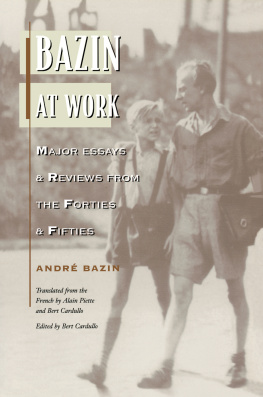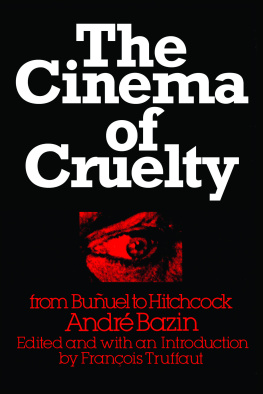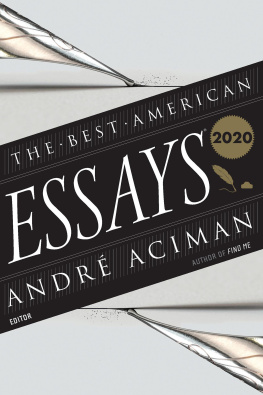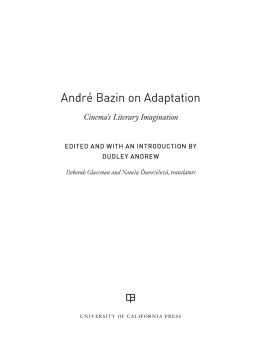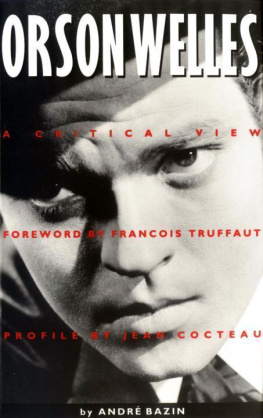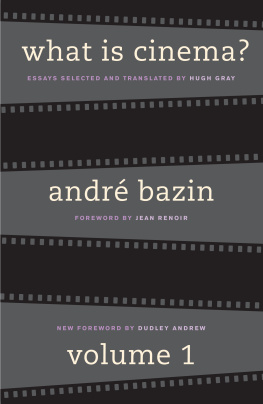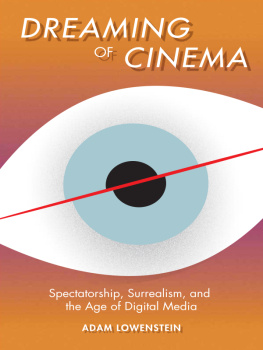Bazin André - Bazin at work: essays and reviews from the forties and fifties
Here you can read online Bazin André - Bazin at work: essays and reviews from the forties and fifties full text of the book (entire story) in english for free. Download pdf and epub, get meaning, cover and reviews about this ebook. City: London, year: 1997, publisher: Taylor and Francis;Routledge, genre: Detective and thriller. Description of the work, (preface) as well as reviews are available. Best literature library LitArk.com created for fans of good reading and offers a wide selection of genres:
Romance novel
Science fiction
Adventure
Detective
Science
History
Home and family
Prose
Art
Politics
Computer
Non-fiction
Religion
Business
Children
Humor
Choose a favorite category and find really read worthwhile books. Enjoy immersion in the world of imagination, feel the emotions of the characters or learn something new for yourself, make an fascinating discovery.
- Book:Bazin at work: essays and reviews from the forties and fifties
- Author:
- Publisher:Taylor and Francis;Routledge
- Genre:
- Year:1997
- City:London
- Rating:3 / 5
- Favourites:Add to favourites
- Your mark:
- 60
- 1
- 2
- 3
- 4
- 5
Bazin at work: essays and reviews from the forties and fifties: summary, description and annotation
We offer to read an annotation, description, summary or preface (depends on what the author of the book "Bazin at work: essays and reviews from the forties and fifties" wrote himself). If you haven't found the necessary information about the book — write in the comments, we will try to find it.
Bazin André: author's other books
Who wrote Bazin at work: essays and reviews from the forties and fifties? Find out the surname, the name of the author of the book and a list of all author's works by series.
Bazin at work: essays and reviews from the forties and fifties — read online for free the complete book (whole text) full work
Below is the text of the book, divided by pages. System saving the place of the last page read, allows you to conveniently read the book "Bazin at work: essays and reviews from the forties and fifties" online for free, without having to search again every time where you left off. Put a bookmark, and you can go to the page where you finished reading at any time.
Font size:
Interval:
Bookmark:

BAZIN AT WORK
BAZIN AT WORK
MAJOR ESSAYS & REVIEWS FROM THE FORTIES & FIFTIES
ANDR BAZIN
Translated from the French by Alain Piette and Bert Cardullo
Edited by Bert Cardullo

First Published 1997 by Routledge
Published 2014 by Routledge
Park Square, Milton Park, Abingdon, Oxon OX14 4RN
711 Third Avenue, New York, NY, 10017, USA
Routledge is an imprint of the Taylor & Francis Group, an informa business
Copyright 1997 by Routedge, Inc.
All rights reserved. No part of this book may be reprinted or reproduced or utilized in any form or by any electronic, mechanical or other means, including photocopying or recording, or in any information storage of retrieval system, without permission in writing from the publisher.
Cataloging-in-Publication Data available from the Library of Congress.
ISBN 13: 978-0-415-90017-1 (hbk)
ISBN 13: 978-0-415-90018-8 (pbk)
CONTENTS
13. Niagara
Alain Piette and Bert Cardullo would like to thank Mme Janine Bazin, as well as the following journals and publishers, for permission to print English translations of Andr Bazins work: Esprit, Cahiers du Cinma, and ditions du Cerf. They would also like to thank William Germano of Routledge for his belief in this project and his long-suffering patience with its editor; Dudley Andrew of the University of Iowa for his encouragement and help with the bibliography; and John Mosier of Loyola University in New Orleans for giving them the confidence to undertake a translation of this magnitude. Bert Cardullo would like in addition to remember here Raymond Beirne, under whose inspiring tutelage at the University of Florida he first became interested in the study of film, and whose modesty-cum-simplicity, yet courageous catholicity of taste and spirit, matched Bazins own.
Andr Bazin was born on April 18, 1918, in the city of Angers in northwest France, but moved with his family to the western seaport of La Rochelle when he was five years old. Since he wanted to become a teacher, he studied first at the cole normale of La Rochelle (1936) and the cole normale of Versailles (193738), then at the cole normale suprieure of Saint-Cloud (193841). Bazin graduated from Saint-Cloud with the highest honors (after he was called up for military service in 1939, then demobilized in mid-1940) but was disqualified from teaching in French schools because of a stutter. The failed teacher quickly turned into a missionary of the cinema, his passion for which was part of his general passion for culture, truth, and moral or spiritual sensibility.
In 1942, during the German Occupation, Bazin became a member of an organization in Paristhe Maison des Lettresthat was founded to take care of young students whose regular scholastic routine had been disturbed by the war. There he founded a cinema club where he showed politically banned films in defiance of the Nazi authorities and the Vichy government. During World War II, in 1943, Bazin also worked at the Institut des hautes tudes cinmatographiques (I.D.H.E.C.), the French film school, to which he was appointed director of cultural services after the war. After the Liberation, he was in addition appointed film critic of a new daily newspaper, Le Parisien libr. Thus began his formal life as a public critic and with it the development of a new type of movie reviewingone of Bazins singular achievements was his ability to make his insights understood to readers on all levels without any concessions to popularizing.
From the postwar period on, Bazin became a more or less permanent contributor to numerous French periodicals that covered most of the political spectrum: Lcran Franais (liberal), France-Observateur (socialist), Esprit (left-wing Catholic monthly), Radio-Cinma-Tlvision (Catholic and slightly less left-wing; today called Tlrama), LEducation Nationale (non-religious and state-run), and the more and more conservative Le Parisien libr. In addition, he wrote for two notable, specialized monthlies: La Revue du Cinma, which Bazin started in 1947 but which collapsed in 1949; and Les Cahiers du Cinma, which he founded in 1951 with Lo Duca and Jacques Doniol-Valcroze and which grew under his direction into Europes most influential, and one of the worlds most distinguished, film publications. As if all this writing and editing were not enough, Bazin contributed to foreign magazines (mainly Italian), was active in film societies and cultural associations (popular ones, like Travail et Culture), and attended film conferences and festivals (such as Venice and Cannes). He maintained all these activities (plus a family consisting of his wife, Janine, and a son, Laurent) despite a long and painful illness, leukemia, which he contracted in 1954 and from which he died at Bry-sur-Marne on November 11, 1958. Perhaps because of his fatigue, he grew attached toward the end of his life to television viewing, becoming one of that mediums first perceptive critics. At the time of his death, he was even working on a film script commissioned by the producer Pierre Braunberger, Les glises romanes de Saintonge, which he probably would have directed himself had he lived.
As Bazins biographer, Dudley Andrew, has argued, Andr Bazins impact on film art, as theorist and critic, is widely considered to be greater than that of any single director, actor, or producer in the history of the cinema. He is credited with almost single-handedly establishing the study of film as an accepted intellectual pursuit, as well as with being the spiritual father of the French New Wave. Seeking a new and revivified cinema, such men as Franois Truffaut, Jean-Luc Godard, Jacques Rivette, and Claude Chabrol wrote under Bazins tutelage at Cahiers du Cinma. As critics, these individuals contributed significantly to the development of theory, particularly the auteur theory, which was derived from Bazins ideas and which argued that since a film is a work of art necessarily stamped with the personality of its creator, it is the director above all who gives the film its distinctive quality. As filmmakers, Truffaut and company comprised the first generation of cinastes whose work was thoroughly grounded in film history and theory, and thus they contributed heavily to Bazins effort to get the cinema recognized as a serious and important field of study rather than merely as an avenue of escape from the pressures of life.
Unlike nearly all the other authors of major film theoriesand he was the realist among themAndr Bazin was a working or practical critic who wrote regularly about individual films. He never left a systematic book of theory; instead he preferred to have implicit theoretical dialogues with filmmakers and other critics through his critical writing in a number of journals. It has been suggested that the best of his criticism has been lost because it occurred in the form of oral presentations and debates at such places as I.D.H.E.C. That may be the case; however, the most important of his essayssome sixty of themwere collected in the posthumously published Quest-ce que le cinma? (195862); the rest lie scattered in the various magazines enumerated above. Then there are his books on Jean Renoir, Orson Welles, and Charlie Chaplin, all published after his death, like the four volumes of Quest-ce-que le cinma?. See the bibliography for details on these works and translations in addition to those contained here.
Next pageFont size:
Interval:
Bookmark:
Similar books «Bazin at work: essays and reviews from the forties and fifties»
Look at similar books to Bazin at work: essays and reviews from the forties and fifties. We have selected literature similar in name and meaning in the hope of providing readers with more options to find new, interesting, not yet read works.
Discussion, reviews of the book Bazin at work: essays and reviews from the forties and fifties and just readers' own opinions. Leave your comments, write what you think about the work, its meaning or the main characters. Specify what exactly you liked and what you didn't like, and why you think so.

